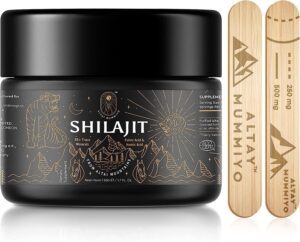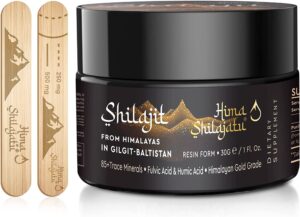
As an affiliate, we earn a small commission when you make a purchase through the links in our blog post. We appreciate your support and hope you find the products helpful.
Shilajit, a mysterious substance revered in ancient civilizations like Ayurveda and traditional medicine systems, has experienced a resurgence in popularity as a natural health remedy and supplement. This dark, resinous substance, formed over centuries, has been celebrated for its potential health benefits.
In this article, we will delve into the wonders of shilajit, exploring its nutritional composition, historical significance, various health benefits, appropriate usage, and potential side effects.
What is Shilajit?
Shilajit is a tar-like, mineral-rich substance that oozes from rocks in mountainous regions, predominantly found in the Himalayas, Altai, Caucasus, and other mountain ranges. It forms as a result of the decomposition of plant and microbial matter over thousands of years. Rich in essential minerals, fulvic acid, amino acids, and other bioactive compounds, shilajit is believed to offer numerous health advantages.
Historical and Cultural Significance
In Ayurveda, an ancient Indian system of medicine dating back over 5,000 years, shilajit is highly regarded as a potent remedy for various ailments and as a rejuvenating substance. Monks and practitioners in the Himalayan region were known to use shilajit to enhance their physical and mental endurance, boost vitality, and support overall well-being. It was considered an essential part of their traditional healing practices and spiritual pursuits.
Similarly, in other regions where shilajit was available, such as the Altai Mountains, Tibetan Plateau, and Caucasus, local cultures and traditional healers also incorporated shilajit into their traditional medicine practices.
Shilajit’s historical use by monks and healers underscores its reputation as a valuable natural substance, which continues to be embraced and researched for its potential health benefits in modern times.
However, it is essential to note that historical use does not substitute for scientific evidence, and further research is ongoing to explore and confirm the specific health effects of shilajit.
Nutritional Composition
Shilajit’s nutritional composition is quite unique and contributes to its reputation as a valuable natural substance with potential health benefits. While its exact composition may vary slightly depending on the geographical source, shilajit typically contains a wide range of bioactive compounds and essential nutrients. Here are some of the key components found in shilajit:
Fulvic Acid: One of the most abundant and significant components of shilajit is fulvic acid. This organic acid plays a crucial role in facilitating nutrient absorption in the body, making it easier for cells to uptake and utilize nutrients.
Minerals: Shilajit is rich in various essential minerals, including magnesium, potassium, calcium, iron, manganese, zinc, copper, and selenium. These minerals are vital for numerous physiological functions, supporting overall health and well-being.
Amino Acids: Shilajit contains a variety of amino acids, which are the building blocks of proteins and essential for various bodily processes, including tissue repair and neurotransmitter synthesis.
Dibenzo-alpha-pyrones: These bioactive compounds found in shilajit have antioxidant properties, helping to neutralize free radicals and reduce oxidative stress.
Dibenzo-alpha-pyrone chromoproteins: These compounds have been studied for their potential anti-inflammatory effects.
Hippuric Acid: Shilajit contains hippuric acid, which may have diuretic and anti-inflammatory properties.
Phenolic Lipids: These compounds have antioxidant properties and contribute to shilajit’s potential health effects.
Terpenoids: Shilajit contains various terpenoids, which are natural compounds known for their potential health benefits.
Diterpenes and Triterpenes: These compounds have been studied for their anti-inflammatory and antioxidant properties.
The combination of these bioactive compounds and essential nutrients in shilajit is believed to contribute to its adaptogenic properties, which means it may help the body adapt to stress and maintain overall balance.
Health Benefits of Shilajit
Increased Energy and Stamina: Shilajit is believed to enhance energy levels and combat fatigue, promoting a sense of vitality and stamina.
Cognitive Support: It may support brain health, improving memory, focus, and mental clarity.
Antioxidant Properties: Shilajit’s rich antioxidant content helps combat oxidative stress and neutralize harmful free radicals.
Immune System Support: It may strengthen the immune system, aiding the body in defending against infections and illnesses.
Adaptogenic Effects: Shilajit acts as an adaptogen, helping the body adapt to stress and maintain a balanced response.
Joint and Bone Health: It may support joint health and promote bone density, potentially benefiting those with age-related concerns.
Anti-Inflammatory Properties: Shilajit’s anti-inflammatory effects can help reduce inflammation and alleviate discomfort.
Cell Regeneration: Some studies suggest that shilajit may stimulate cell regeneration and tissue repair.
Hormonal Balance: It may support hormonal health, benefiting both men and women.
Aid in Detoxification: Shilajit can assist the body in flushing out toxins and heavy metals, supporting overall detoxification processes.
Quality and Authenticity
Ensuring the quality and authenticity of shilajit is essential to experience its potential health benefits safely. As shilajit’s popularity has grown, it has also become susceptible to adulteration and counterfeit products. Here are some best practices to consider when evaluating the quality and authenticity of shilajit:
Sourcing from Reputable Brands: Purchase shilajit from well-known and reputable brands with a track record of delivering high-quality supplements. Look for companies that follow strict quality control measures and have positive customer reviews.
Purity and Authenticity Testing: Reliable brands often conduct third-party testing to verify the purity and authenticity of their shilajit. Look for products that have undergone such testing and are willing to share the results with consumers.
Ingredients List and Transparency: Review the ingredients list on the product label to ensure there are no additives, fillers, or synthetic substances. Authentic shilajit should contain only shilajit resin and natural components.
Geographical Source: Shilajit sourced from different regions may have slight variations in its composition. Some sources, like the Himalayas, are considered particularly valuable. Know where the shilajit is sourced from and research the reputation of that specific region.
Physical Characteristics: Authentic shilajit is a resinous substance with a distinct appearance and aroma. It should have a rich, dark color and a strong earthy scent. Be cautious if the product appears significantly different from these characteristics.
Packaging and Storage: Quality shilajit is often packaged in airtight containers to protect it from moisture and contamination. Avoid products with broken seals or damaged packaging.
Customer Reviews and Feedback: Check for customer reviews and feedback on the brand’s website or other reputable platforms. Positive reviews and testimonials can indicate the brand’s commitment to delivering authentic shilajit.
Certifications: Some brands may have certifications, such as organic or Good Manufacturing Practice (GMP) certifications, which can add an extra layer of assurance about the product’s quality.
Consult Healthcare Professional: Before starting any new supplement, including shilajit, consult a qualified healthcare professional, especially if you have underlying health conditions or are taking medications. They can provide personalized advice based on your health status.
Best Shilajit Brands

FEATURES
- Premium Quality
- Contains 80 potent minerals and substances
- Highest efficacy shilajit available in the market
- Processed using patented technologies and proudly manufactured in the USA.

FEATURES
- Highest Gold Grade Authentic Shilajit provided in it's purified resin form.
- Lab tested for safety by USA, third party, FDA registered, cGMP certified, independent laboratory.
- We personally source, select and oversee purification in the Himalayas. We never deal with middle men.
- Wild crafted from pristine and remote regions at altitudes above 16,000 feet.

FEATURES
- Highest Gold Grade Authentic Shilajit provided in it's purified resin form.
- Traditional purification process - purified at low temperatures using only spring water.
- 85+ TRACE MINERALS WITH FULVIC ACID & HUMIC ACID
- Wild crafted from pristine and remote regions at altitudes above 14,000 feet.

FEATURES
- Highest Gold Grade Authentic Shilajit provided in it's purified resin form.
- Without solvent extraction or chemical processing. No fillers or additives.
- 85+ TRACE MINERALS WITH FULVIC ACID & HUMIC ACID
- Two months worth of supply + measuring spoon included
How to Use Shilajit: Dosage and Forms
Shilajit is available in various forms, including capsules, powders, and the original resin.
The recommended dosage may differ depending on the product’s concentration and purity. However, a general guideline is to take 300-500 mg of shilajit per day, preferably with meals.
It is crucial to follow the manufacturer’s instructions and, more importantly, consult a healthcare professional for personalized advice, especially if you have underlying health conditions or are taking medications.
Possible Side Effects and Precautions
While shilajit is generally considered safe for most people when taken in appropriate doses, it’s essential to be aware of potential side effects and take necessary precautions. Here are some considerations to keep in mind:
1. Allergic Reactions: Some individuals may be sensitive or allergic to shilajit. If you experience any allergic reactions, such as skin rashes, itching, or difficulty breathing, discontinue use immediately, and seek medical attention.
2. Digestive Discomfort: In some cases, shilajit may cause mild digestive discomfort, including stomach upset, nausea, or diarrhea. If you experience these symptoms, consider reducing the dosage or discontinuing use.
3. Heavy Metal Contamination: Shilajit harvested from certain regions may contain trace amounts of heavy metals. To avoid potential exposure to contaminants, purchase shilajit from reputable brands that conduct third-party testing for purity and authenticity.
4. Medication Interactions: If you are taking medications, especially for chronic health conditions, consult your healthcare professional before using shilajit. It may interact with certain medications, affecting their efficacy or causing adverse effects.
5. Pregnancy and Breastfeeding: Pregnant and breastfeeding women should avoid shilajit due to a lack of sufficient safety data during these periods. It’s essential to prioritize the well-being of both the mother and the child.
6. Underlying Health Conditions: Individuals with certain health conditions, such as gout, kidney stones, or any chronic medical condition, should consult a healthcare professional before using shilajit to ensure it does not exacerbate their condition.
7. Dosage: Stick to the recommended dosage guidelines provided by the manufacturer or your healthcare professional. Taking excessive amounts of shilajit may lead to unwanted side effects.
8. Quality and Authenticity: Purchase shilajit from reputable sources to ensure you are getting a pure and authentic product free from contaminants or fillers.
9. Avoid Long-term Use Without Breaks: Some experts recommend taking breaks from shilajit use to prevent the body from becoming reliant on the supplement.
As with any supplement or herbal remedy, it’s essential to approach shilajit with caution and consult a qualified healthcare professional if you have any concerns or questions about its suitability for your individual health needs.
Remember that individual responses to shilajit may vary, and while it offers potential health benefits for many, it may not be suitable for everyone. Always prioritize your safety and well-being when considering any new supplement.
FAQ
Q1: What is Shilajit? A: Shilajit is a sticky resinous substance that forms over centuries in the cracks of rocks in mountainous regions like the Himalayas. It is rich in minerals, fulvic acid, and other bioactive compounds, and has been used in traditional medicine systems for its potential health benefits.
Q2: What are the Benefits of Shilajit? A: Shilajit is believed to offer various benefits, including increased energy and stamina, cognitive support, antioxidant properties, immune system support, and adaptogenic effects. It may also promote joint health, cellular regeneration, and hormonal balance.
Q3: How Do I Use Shilajit? A: Shilajit is available in different forms, such as resin, powder, or capsules. The recommended dosage typically ranges from 300-500 mg per day. It is usually taken with meals or as advised by a healthcare professional.
Q4: Is Shilajit Safe to Use? A: When used as directed, shilajit is generally considered safe for most people. However, some individuals may experience mild side effects like digestive discomfort. Pregnant or breastfeeding women, individuals with specific medical conditions, and those on medications should consult a healthcare professional before using shilajit.
Q5: Can Shilajit Boost Energy and Vitality? A: Yes, shilajit is commonly praised for its energy-boosting properties. It may help combat fatigue, increase vitality, and enhance physical and mental endurance.
Q6: Is Shilajit Suitable for Vegans? A: Shilajit is a natural substance and is suitable for vegans. However, it’s essential to check the product label to ensure there are no additional animal-derived ingredients in the supplement.
Q7: Does Shilajit Help with Cognitive Function? A: Some studies suggest that shilajit may improve cognitive function, memory, and mental clarity due to its impact on brain health. However, more research is needed to establish its precise effects.
Q8: Can Shilajit Help with Anti-Aging? A: Shilajit’s antioxidant properties may help neutralize free radicals and reduce oxidative stress, which can contribute to the aging process. However, it’s essential to maintain realistic expectations and adopt a holistic approach to anti-aging.
Q9: How Long Does It Take to Experience Shilajit’s Benefits? A: Individual responses may vary, and the time to experience shilajit’s benefits can differ from person to person. Some individuals report noticing improvements within a few weeks, while others may require more time. Consistent and responsible use is key.
Q10: Can I Take Shilajit with Other Supplements? A: Shilajit is generally safe to take with other supplements. However, to ensure compatibility and avoid potential interactions, consult a healthcare professional before combining shilajit with other supplements or medications.